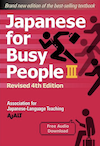| Chapter |
Grammar Points |
| 1 |
~ようです。/~みたいです。 (seems ...; like ...)
[sound/voice/smell/taste]がします。
くれます。 (give to me) |
| 2 |
~てあげます/~てくれます/~てもらいます。
~ようになります。 (become able to ...) |
| 3 |
~く/に します。 (describing making change)
~すぎます。 (too ...) [exceeding]
~ようにします。 (try to ...; make sure to ...) |
| 4 |
~そうです。 (I heard ...; I read ...)
~ために (in order to ...) [purpose]
~て/~ないで・~ずに (with/without ...ing) |
| 5 |
~こと [nominalizing sentences]
~ておきます。 [preparatory actions]
~てあります。 [result of an intentional act] |
| 6 |
~まま [expressing a situation that remains unchanged]
~おかげで (thanks to ...) / ~せいで(due to ...) / ~ため(に) [cause]
~と、いいです。 (It would be nice if ...) |
| 7 |
うけみ ① [passive structures whose subject is an object]
~べきです。 (ought to ...; should ...) |
| 8 |
うけみ ② [passive structures whose subject is a person]
~てはいけません。 [prohibit]
~という~ (... named/called ...) |
| 9 |
くるかどうか わかりません。 [quoted yes/no question]
いつ くるか わかりません。 [quoted question]
~ことができます。 (can ...; be able to ...) |
| 10 |
~ても/~でも (even if ...)
[いつ/どこ/なに/だれ/どんな/いくら] +ても
めいれいけい [imperative form] 「のめ、のむな」「たべろ、たべるな」 |
| 11 |
~らしいです。 (seems ...)
~ように、~。 (so that ...; so as to ...)
~たばかり (have just ...; just ...)
|
| 12 |
~やすい/~にくい (easy to ... /difficult to ...)
~ほど~ない (not as ... as ...)
~ば~ほど (the more ... the more ...) |
| 13 |
~はずです。 (should ...; ought to ...)
~のに (in spite of ...)
|
| 14 |
~(よ)うとします。 (be about to ...)
~つもりです。 (intend to ...) |
| 15 |
~ています/~ていました。 [state in effect]
~ところです。 [expressing the stage of action]
|
| 16 |
しえき [causative structures]
しえきうけみ [causative-passive structures] |
| 17 |
~のに [expressing usefulness and purpose]
~てほしいです。 (want someone to do ...)
~たがっています。 ([third person] wants to ...) |
| 18 |
~ことにします。 (I decide to ...)
~ことになります。 (be decided to ...)
~わけです。 (that’s why ...)
「ふえます+はじめました」→「ふえはじめました」 [verb + verb] |
| 19 |
けいご① 「いらっしゃいます」(とくべつなけいご)[honorific expressions]
けいご② 「お~になります」 [honorific expressions]
~ようにいいます。 (tell someone to do ...) |
| 20 |
~たら~ました。 [unexpected; surprise; result]
~てしまいました。 [regret or completion] |
| 21 |
けいご③ 「もうします」(とくべつなけいご) [humble expressions]
けいご④ 「お~します」 [humble expressions]
けいご⑤ 「です」→「ございます」 [polite expressions]
|
| 22 |
それで/そこで/いっぽう/それに/そして/それから/また/まず/はじめに/つぎに/それから |
| 23 |
まったく~ない/すこしも~ない/ちっとも~ない/けっして~ない/なかなか~ない |
| 24 |
Formal words わたし → わたくし、きのう → さくじつ |
